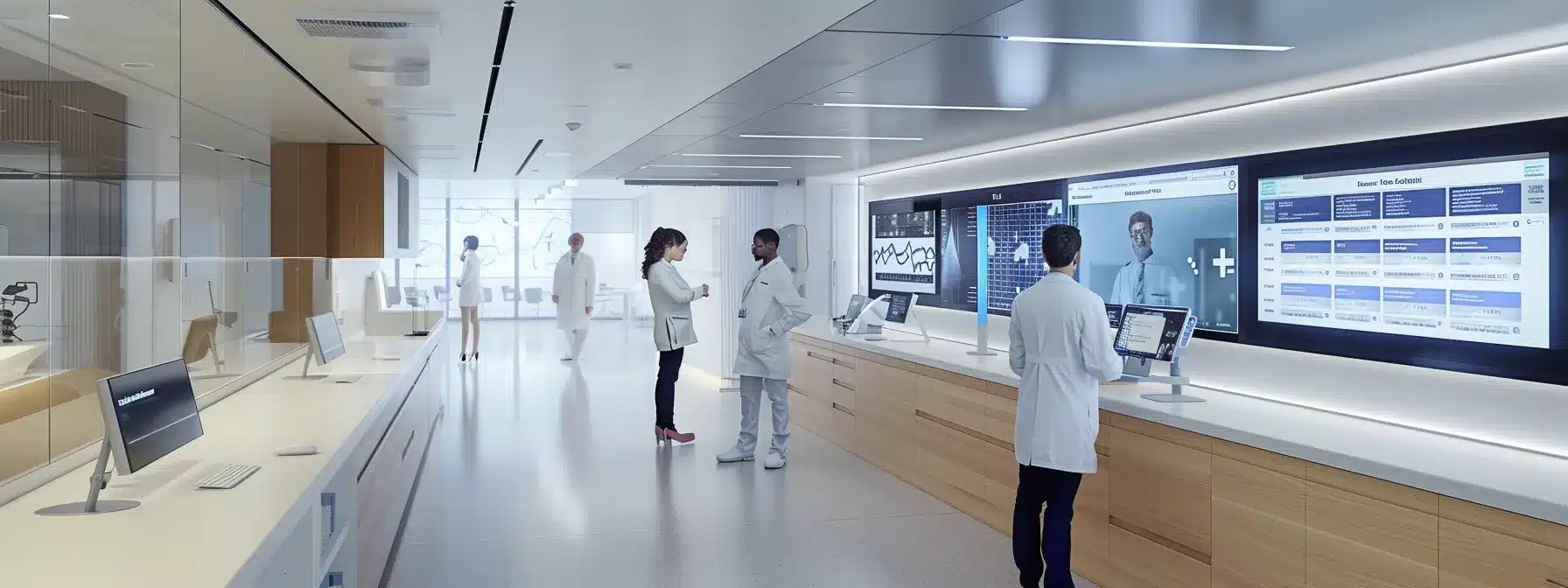
Exploring How Modern Claim Processing Technology Surpasses Traditional Approaches for Efficiency
Title: Exploring How Modern Claim Processing Technology Surpasses Traditional Approaches for Efficiency Introduction: How many claims does your practice process each month, and how many hours are wasted on manual tasks? Modern claim processing technology significantly cuts down time while increasing accuracy compared to traditional methods. This post will explore the importance of automation, the role of data analytics, and how these advancements improve customer satisfaction. By reading this content, healthcare providers and billing teams will discover solutions to enhance efficiency and reduce administrative burdens, ultimately leading to improved patient care and financial performance.
Understanding Modern Claim Processing Technology

Modern claim processing systems are designed to streamline healthcare transactions, employing advanced technologies and features that surpass traditional methods. Key characteristics of older approaches, such as extensive manual tasks and slower processing times, highlight the benefits of automated solutions. Exploring these distinctions provides crucial knowledge on how cryptography and efficiency enhance the revenue cycle in healthcare, emphasizing the importance of adapting to modern practices.
Defining Modern Claim Processing Systems and Their Features
Modern claim processing systems leverage advanced technologies, such as natural language processing, to improve the efficiency of healthcare transactions. These systems emphasize the principle of automation, which reduces manual tasks significantly while allowing for better evaluation of claims and predictions regarding payment outcomes. By integrating these technologies, healthcare providers can streamline workflows, minimize errors, and enhance overall revenue cycle performance, allowing them to focus more on patient care rather than administrative burdens.
Identifying Key Characteristics of Traditional Claim Processing Methods
Traditional claim processing methods are often characterized by extensive manual tasks, resulting in increased processing times and higher chances of errors. These approaches frequently rely on outdated regulations and policies that impede efficiency, making it difficult for healthcare providers to maximize their revenue cycle. Research indicates that these older systems struggle to provide real-time data on claim statuses, diminishing the overall value delivered to both providers and patients and highlighting the need for modern solutions that address these deficiencies effectively.
Comparing Efficiency in Modern and Traditional Claim Processing Methods

Evaluating the speed of processing claims highlights the advantages of modern solutions, which drastically reduce turnaround times. Analyzing error rates and compliance issues reveals that contemporary systems significantly lower risks associated with claims management. Furthermore, discussing the impact on resource allocation showcases how modern architecture enhances cost efficiency, allowing healthcare providers to redirect focus towards patient care. Each of these elements underscores the growing necessity for advanced processing technologies in today’s healthcare environment.
Evaluating Speed in Processing Claims With Modern Solutions
Modern claim processing solutions significantly improve the speed at which healthcare transactions are completed. For instance, leveraging a mobile app enables providers to submit claims in real-time, instantly linking with necessary databases and reducing the need for a lengthy approval process. This technological revolution, often described as a ‘black box,’ utilizes the internet of things (IoT) to facilitate seamless communication between systems, leading to faster resolution of claims and minimized errors, ultimately enhancing overall operational efficiency.
Analyzing Error Rates and Compliance Issues in Both Approaches
Modern claim processing technology significantly reduces error rates associated with healthcare transactions by utilizing advanced data mining techniques. These systems enhance usability and attention to detail, addressing common compliance issues that arise in traditional methods. For instance, automated verification processes provide real-time insights into claims status, ensuring that all dimensions of regulatory requirements are met promptly, which ultimately streamlines operations for healthcare providers.
Discussing the Impact on Resource Allocation and Cost Efficiency
Modern claim processing technology brings significant innovation to resource allocation and cost efficiency in healthcare. By automating routine tasks, these systems allow practices to allocate their resources more effectively, resulting in reduced overhead costs and improved financial health. For example, with streamlined workflows and real-time updates on medication coverage and claims statuses, providers can respond promptly to consumer needs, ensuring they maintain a competitive edge while enhancing patient care.
The Role of Automation in Modern Claim Processing

Automated workflows in claims management leverage advanced technologies to streamline processes, significantly enhancing productivity. Automation minimizes human error and boosts accuracy in claims processing, ensuring more reliable outcomes. Real-life applications illustrate how organizations utilize automation to meet regulatory demands and optimize efficiency, providing valuable insights into its transformative role within the claims industry.
Exploring Features of Automated Workflows in Claims Management
Automated workflows in claims management significantly enhance the organization of insurance claims by streamlining data analysis and processing. These systems utilize advanced technologies to gather and assess evidence related to claims more efficiently, reducing the need for manual review and increasing the accuracy of outcomes. By minimizing human involvement in routine tasks, automation allows for quicker response times, enabling healthcare providers to focus resources on delivering quality patient care while ensuring compliance and maximizing revenue opportunities.
How Automation Reduces Human Error and Boosts Accuracy
Automation in modern claim processing significantly minimizes human error and enhances accuracy by applying systematic methodologies similar to the scientific method in physics and quantum studies. By automating the data verification process, healthcare providers can ensure that claims are processed with precision, ultimately leading to improved truthfulness in financial reporting and compliance. This reliance on technology alleviates the burden on staff, allowing them to focus on more complex tasks while reducing inaccuracies often seen in traditional methods.
Real-Life Applications of Automation in the Claims Industry
In the claims industry, automation has showcased its effectiveness through various real-life applications, particularly in enhancing accessibility to vital claims information. For instance, machine learning algorithms are employed to analyze data patterns, which ensures a more efficient claims review process. Randomized controlled trials within healthcare systems have demonstrated that such automated solutions lead to quicker resolution times, ultimately serving to benefit society by improving patient outcomes as claims are processed timely and accurately.
How Data Analytics Enhances Modern Claim Processing

Leveraging predictive analytics allows insurance companies to improve decision-making, enhancing efficiency in claim processing. Data-driven insights ensure regulatory compliance by addressing ethical concerns around information management, particularly relevant in the context of vaccine distribution. Case studies showcase successful integration of computer vision technologies, offering practical examples of how data analytics transforms claims management for better outcomes.
Leveraging Predictive Analytics to Improve Decision-Making
Leveraging predictive analytics in healthcare claims processing plays a critical role in enhancing decision-making. By applying principles from epistemology, data scientists can analyze complex patterns related to claims and disease trends, using this information to guide providers in their motivations for seeking timely reimbursement. For instance, predictive models can inform providers about the likelihood of claim approvals based on historical data, enabling more strategic planning and improved financial outcomes.
Ensuring Regulatory Compliance Through Data-Driven Insights
Data-driven insights play a pivotal role in ensuring regulatory compliance within modern claim processing systems, especially in dynamic environments like New York City. By leveraging intelligence through advanced analytics, healthcare providers can identify correlations between claim submissions and industry regulations, thus minimizing risks associated with compliance failures. This concept of using digital transformation not only enhances the accuracy of claims processing but also empowers organizations to proactively address regulatory challenges, ultimately leading to improved operational efficiency and better patient outcomes.
Case Studies Showcasing Successful Data Integration in Claims
Case studies have highlighted the transformative impact of data integration within claim processing, showcasing specific infrastructures that utilize advanced analytics for improved efficiency. One notable prototype involved a healthcare network that implemented a data analysis tool to measure causality between claim denials and documentation errors, resulting in a 25% reduction in denied claims within six months. This real-world example emphasizes the importance of systematic measurement and analysis in refining processes, thereby enabling providers to enhance their claims management and ultimately improve cash flow.
Customer Experience and Satisfaction in Claims Processing

Modern claim processing technology significantly enhances customer experience by streamlining communication channels through advanced platforms. Understanding customers’ expectations in claims processing is vital for satisfaction. Additionally, employing modern methods for measuring satisfaction provides deeper insights compared to traditional approaches. Each of these aspects contributes to creating a more efficient claims process that meets the needs of both providers and patients.
Streamlining Communication Channels Through Modern Platforms
Modern platforms significantly enhance communication channels within claims processing by utilizing advanced technologies, including chatbots and learning methods that analyze large data sets. These innovations streamline dispute resolution by providing real-time assistance and immediate responses to inquiries, which improves overall customer satisfaction. By optimizing information consumption and facilitating clearer communication, healthcare providers can effectively address patient concerns, thereby fostering trust and loyalty in their services.
Understanding Customers’ Expectations in Modern Claim Experiences
Understanding customers’ expectations in modern claim experiences is vital for enhancing satisfaction in today’s healthcare landscape. People seek transparency and speed when navigating the claims process, influenced by the phenomenon of big data that drives real-time updates and streamlined communication. This is similar to principles found in quantum mechanics, where the focus on precision and efficiency impacts outcomes significantly. With improved technology, healthcare providers can cater to these expectations, ultimately fostering trust and loyalty among patients while ensuring compliance in a rapidly evolving environment.
Measuring Customer Satisfaction: Traditional vs. Modern Methods
Measuring customer satisfaction in claims processing has evolved significantly from traditional methods, which often relied on limited surveys and anecdotal feedback. In contrast, modern approaches utilize real-time data analytics and customer feedback mechanisms that provide greater transparency and utility. This shift not only reduces misinformation but also fosters a systematic discipline in addressing customer needs, leading to improved overall experiences for patients and providers alike.
Future Trends in Claim Processing Technology

Anticipating the role of artificial intelligence in claims management highlights the use of algorithms to improve processing efficiency. Exploring blockchain technology reveals its potential in enhancing contract integrity and data access. Preparing for industry shifts ensures adaptation to emerging technologies through simulations, fostering an open access environment for healthcare providers to optimize claims handling and respond effectively to changes in the landscape.
Anticipating the Role of Artificial Intelligence in Claims Management
As healthcare transitions from traditional methods, artificial intelligence (AI) is set to play a critical role in reshaping claims management. By utilizing deep learning algorithms, these systems can analyze vast databases of historical claims data, improving the accuracy of predictions and reducing denial rates. This analogy to traditional training methods highlights how AI can provide continuous learning and adaptation, allowing healthcare providers to streamline their processes and address trends effectively, ultimately enhancing operational efficiency and patient care.
Exploring Blockchain Technology’s Potential Impact on Claims Handling
Blockchain technology holds significant promise for enhancing claims handling in the healthcare sector by improving data collection and security. By utilizing a decentralized ledger, insurers can efficiently track and verify insurance policies while ensuring that all parties involved have real-time access to accurate information. This advancement not only streamlines the claims process but also positively influences customer experience by reducing the time and effort needed to resolve disputes and verify coverage, ultimately fostering greater trust and satisfaction among patients and providers alike.
Preparing for Industry Shifts: Adapting to Emerging Technologies
As the insurance industry continues to evolve, adapting to emerging technologies becomes essential for effective claim processing. Understanding the behavioral patterns surrounding fraud is crucial for successful adoption of these innovations, which can significantly enhance accuracy and efficiency. By fostering a culture of cognition and openness to new tools, healthcare providers can streamline operations, reduce risk, and ultimately improve patient outcomes.
Conclusion
Modern claim processing technology significantly outperforms traditional methods by streamlining administrative tasks and enhancing accuracy. Automation and real-time data analytics empower healthcare providers to focus on patient care while reducing errors and improving financial performance. By embracing these advanced systems, practices can effectively manage claims, ensuring timely reimbursements and compliance with regulations. The shift towards modern solutions is not just beneficial; it is essential for healthcare organizations aiming to thrive in a competitive landscape.

